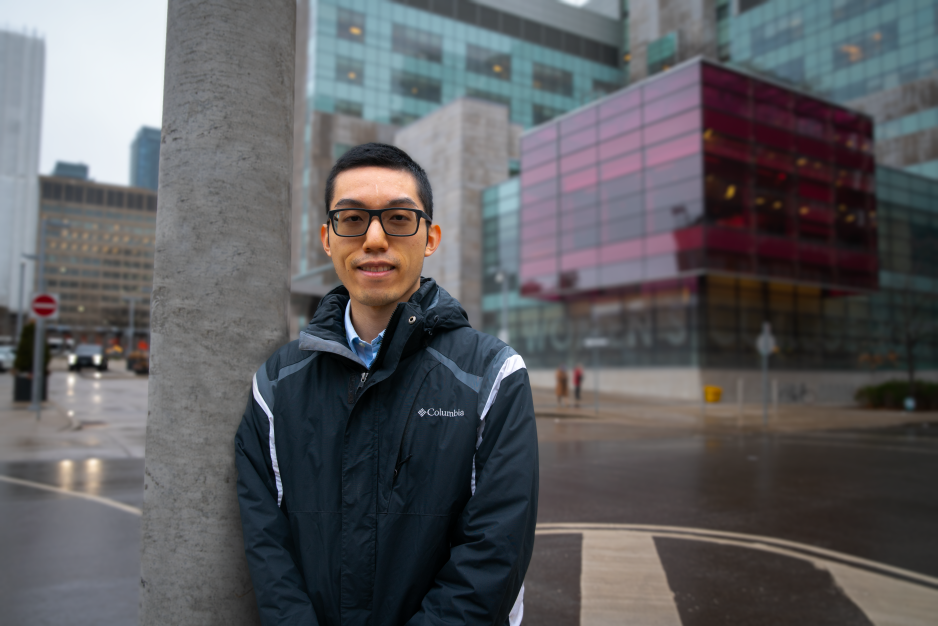Muhammad Mamdani leads team of data scientists that solve problems for frontline health care workers
From computer-generated art to “smart” assistants to online shopping, artificial intelligence (AI) and machine learning are having a growing importance in many aspects of our lives. And AI has enormous growth potential in the health care system, as it can help solve a variety of problems that frontline workers face using data that is already being collected.
“We still live in the era of fax machines in health care, so we’re lagging quite a bit, but we’re going to see a tsunami of AI come to health care in the near future, whether we like it or not,” says Muhammad Mamdani, Professor (Status) at U of T’s Leslie Dan Faculty of Pharmacy and Director of U of T’s Temerty Centre for AI Research and Education in Medicine. “There’s such a wide variety of these solutions and tools. If you can think it, it’s probably coming.”
While the health care system may have a reputation as being slow to adopt technology, it collects an abundance of data – about individual patients, staffing, hospitals and more – that can be accessed to develop AI programs to solve a wide range of problems, improve patient care, and make systems more efficient.
“The health care system’s growth in data generation outpaces every other sector, yet we’re the most behind in how we actually leverage that data to make improvements,” says Mamdani.
As Vice President of Data Science and Advanced Analytics at Unity Health Toronto, which includes St. Michael’s Hospital, St. Joseph’s Health Centre and Providence Healthcare, Mamdani is a leader in developing AI applications in health care that are improving how clinicians make decisions, saving hospitals money, and improving planning of staffing and resources. Mamdani leads a team of approximately 30 data scientists, one of the largest such teams at any hospital in the world. Since 2018, the team has developed and deployed over 40 solutions in Unity Health’s hospitals that address a range of issues that frontline staff face, including hospital operations, staff planning, and clinical decisions.
“The questions have to come from frontline workers and our clinicians, not the data scientists,” says Mamdani. “We will bring the technical skill sets to develop a solution, and they commit to partnering with us on deploying the program in their field.”
For example, one program helps clinical and clerical staff with nurse assignments in the emergency department while maintaining the necessary rules associated with staffing. It has helped cut the amount of time spent on the activity every day from 4 hours to about 15 minutes and has shown to better adhere to staffing rules.
Another program examines head CT images to detect brain bleeds images and flags these images for the neuroradiologist, decreasing the diagnosis turnaround time by 70 per cent and helping patients get appropriate care sooner.
And another newly launched program is helping pharmacists in the cardiovascular unit find the right dose of warfarin for patients recovering after heart surgery.
Fourth-year Doctor of Pharmacy student Martin Ho completed a research rotation with Mamdani’s team in the 2022 winter semester, working on a project that used demographic and clinical data to predict whether people with multiple sclerosis would relapse within three years of a clinic visit, helping clinicians to better develop treatment plans based on patients’ prognoses.
“Even now, it’s challenging for clinicians to predict if and when a patient will relapse, and because of this, it’s been difficult to design treatment plans. This program may help clinicians better match the patient to the appropriate drug, hopefully decreasing the risk of relapse,” says Ho. “It was amazing to learn about the process of how you get from data collection to building and interpreting the model and then rolling it out into the real world.”
Entrepreneurship critical to making AI solutions more broadly available
While the majority of the solutions developed by Mamdani’s team are only used in-house, one program called CHARTWatch is being further developed through private sector investment to be more widely available.
CHARTWatch uses data from over 100 different variables to predict every hour on the hour whether a patient’s condition will dramatically worsen and they will need to be transferred to the ICU or die within the next 48 hours. If a patient is flagged as high-risk, the medical team is paged and must attend to the patient within two hours. Preliminary data suggests that since CHARTWatch was implemented in October 2020, the mortality rate among high-risk patients in general internal medicine has decreased by about 15 per cent.
After CHARTWatch was successfully implemented at Unity Health, other hospitals became interested in the program; however, Mamdani and his team did not have capacity to make the program available more broadly. He collaborated with colleagues from the financial and business sectors to form the start-up company Signal 1, which will focus on commercializing some of the AI solutions developed at Unity Health.
Mamdani says that private sector investment through Signal 1, where Mamdani is clinical advisor, was essential to taking the program beyond the walls of Unity Health. “A hospital’s goal is to serve its patients and ensure that their needs are met in a timely manner. A private sector company can dedicate the time, energy and effort to scaling-up a promising technology,” he says. “Without that private sector collaboration, it would be really hard to deploy things externally.”
Pharmacy training key to making new solutions relevant to patients and clinicians
Mamdani says his pharmacy background has been important in his research, particularly for ensuring that the questions his teams addresses are relevant to clinicians.
“Having that clinical background is so fundamentally important to this sort of work. It helps position AI better in context of the health care system and patient needs,” says Mamdani. “And it brings credibility because as pharmacists we do clinical work, and we understand what clinicians go through. And that is just as important, if not more important, than actually developing the machine learning algorithms."
More News
Image

Dean Lisa Dolovich reappointed for second term
Professor Lisa Dolovich has been reappointed for a second term as Dean of the Leslie Dan Faculty of Pharmacy, University of Toronto, effective July 1, 2025, to December 30, 2030.
Read More
Image

Pharmacy Summer Camp gives high school students insight into pharmacy profession
A new summer camp based at the faculty will give high school students a range of experiences in pharmacy and pharmaceutical sciences.
Read More
Image

Team GloveLift wins 2025 Business Plan Competition with innovative medical device
PharmD students win $5,000 prize for their innovative medical device concept aimed at improving patient care.
Read More

